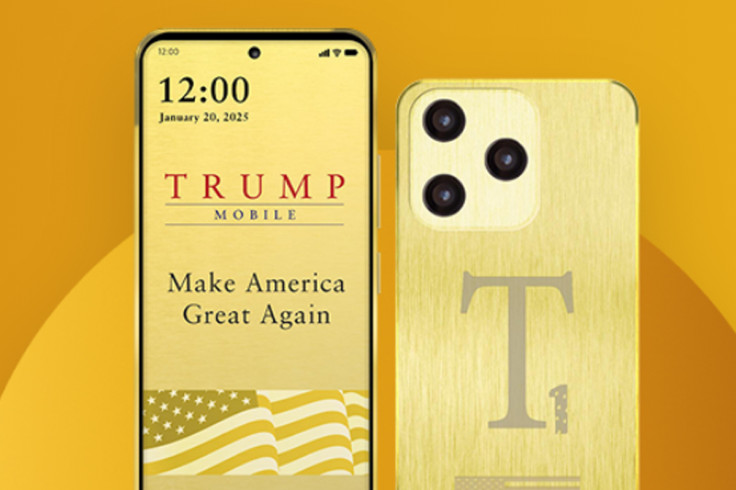Trump Mobile Phone: Critics Slam 'US-Made' Claim as Reports Reveal Likely China Origin
The Trump T1 Phone faces intense scrutiny from industry experts questioning its true manufacturing origin

Touted as a 'US-made' device and linked to President Donald Trump, a new smartphone is facing intense scrutiny, with emerging reports suggesting its manufacturing origin in China.
Experts have questioned the Trump Organization's claim that its smartphone can be wholly produced within the United States.
An industry analyst told BBC it would be 'virtually impossible' for the gold-coloured device to be assembled in the United States due to the retail price of $499 (£367.50).
The Trump Mobile Phone's Contentious Debut
Ethical concerns have also surfaced regarding what is the newest in a line of efforts to profit from President Donald Trump's name. 'It's unbelievable that the Trump family has created yet another way for President Trump to personally profit while in office,' said Meghan Faulkner, communications director for Citizens for Responsibility and Ethics in Washington.
🚨 JUST IN: The Trump Organization has launched "Trump Mobile," a new U.S.-made phone service, introducing American-manufactured devices to the market, get more from your wireless service.
— John F. Kennedy Jr (@Real_JFK_Jr_) June 17, 2025
If you one to get one free follow , repost and drop ❤️ pic.twitter.com/IONcSAP84Q
The phone will also be offered with a mobile phone service charging a monthly rate of $47.45 (£35.14). This numerical value acknowledges Trump's tenure as both the 47th and 45th president. Beyond these financial and ethical considerations, the device's supposed American origin is also facing scrutiny.
The 'US-Made' Claim
Pertinently, the Trump family has not disclosed the firm manufacturing its phone in the United States.
Speaking on Monday's 'The Benny Show' podcast, Eric Trump claimed, 'Eventually, all the phones can be built in the United States of America,' a remark indicating the devices launched in August might not be fully manufactured domestically.
Technology experts have challenged the interpretation of the Trump Organization's 'built in the United States' claim for its handsets, contending it is not feasible to produce smartphones from scratch in the US.
'They don't even have a working prototype. It's extremely unlikely,' said Prof Tinglong Dai, an operations management professor at Johns Hopkins' Carey Business School. 'You would have to have a miracle. You would need to have economies of scale. You would need to have a sustainable demand for this kind of product,' Prof Dai added.
According to Analyst Leo Gebbie of CCS Insight, America currently 'simply does not have the high-tech supply chain,' necessary for smartphone assembly, particularly not by August, as the Trump Organization indicated.
On Monday, the Trump Organization unveiled the T1, a gold-coloured smartphone that will use Google's Android operating system and cost $499.
BREAKING: The Trump Organization announced Trump Mobile, which will offer 5G service starting at $47.45 through the 3 major carriers and will be releasing a phone in August called the “T1 Phone.”
— RedWave Press (@RedWave_Press) June 16, 2025
The phone is described as “a sleek, gold smartphone engineered for performance and… pic.twitter.com/jhtXRLveJZ
'However, it's possible that the device could be assembled in the US with parts imported from abroad. This might be the most likely outcome that lets the T1 claim American sovereignty,' Gebbie said.
During the announcement, the Trump Organization did not divulge key details, including the business partner running the service and licensing the name.
Trump T1 Phone: Made in the US or Made in China?
The unveiling offered scant specifics, notably omitting the partner's identity set to run the service and license the name. However, experts contend that the newly announced smartphone will likely be made in China, even with talk of its US manufacturer.
Though specifics on individual components remain undisclosed, the device's specifications offer a glimpse of what's anticipated.
The Global Component Reality
The T1 Phone sports a mammoth 6.8-inch AMOLED display. This particular screen type is predominantly produced by South Korean firm Samsung. LG, a fellow South Korean company, also manufactures the screen, as does China's BOE.
Given the T1's retail price of $499 (£367.50), the smartphone is expected to feature a processor from Taiwan's MediaTek, which is manufactured in that country. Should the device instead include a Qualcomm chip, its production would also probably take place in Taiwan.
Meanwhile, the phone's advertised 50-megapixel camera will require image-sensing chips—a market primarily controlled by Japan's Sony for smartphones. Other smaller manufacturers exist in China and elsewhere.
The device's memory represents an area where American technology could be employed, possibly from Micron, whose components are produced in the US. However, alternative providers like South Korea's Samsung might act as suppliers.
'Even when there is local manufacturing available, the company will have to rely on components that are being imported from outside the US,' Jeff Fieldhack, research director at Counterpoint Research, said.
© Copyright IBTimes 2025. All rights reserved.






















